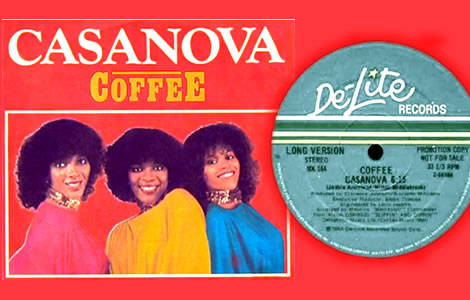
Coffee’s “Casanova” stands as one of the iconic disco hits of the late 1970s and early 1980s, capturing the sound of an era defined by upbeat rhythms, soulful vocals, and dancefloor energy.

This track, inspired by the legendary figure of Casanova, explored themes of love, seduction, and charm, themes that resonated deeply with the disco culture of the time.
Who Were Coffee?
Coffee was a female vocal trio that emerged in the late 1970s, hailing from New York City. The group was composed of Elaine Sims, Gwen Hester, and Dee Dee Bryant.
Their sound was distinctly disco, blending funky basslines, infectious melodies, and soulful harmonies that were well-suited for the dancefloor.
While the trio didn’t achieve long-lasting fame, they made a significant impact with “Casanova,” which became a defining track of the disco era.
The group’s name, Coffee, was a nod to their energetic and vivacious musical style. Though the band didn’t release many records, “Casanova” was their breakout hit, and it allowed them to enjoy brief but intense fame in the disco scene. The track was released in the early 1980s, a time when disco was still thriving, despite shifting trends toward new wave and pop music.
The Meaning Behind “Casanova”
The song “Casanova” draws its inspiration from the historical figure Giacomo Casanova, an 18th-century Italian adventurer known for his romantic escapades.
Casanova became synonymous with the image of a smooth-talking, charismatic lover, a reputation that has endured in popular culture for centuries. In Coffee’s song, this image is used as a metaphor for a man who is a heartbreaker, charming his way through the lives of women, only to leave them in pursuit of his next conquest.
In the lyrics, the women of Coffee confront this Casanova figure, warning him that his days of manipulating hearts are numbered. There’s a sense of empowerment in the song, as the women realize that they won’t fall victim to his charms.
The upbeat, funky tempo combined with the playful yet assertive lyrics made the song a hit, especially in the disco clubs, where themes of romance and personal freedom were often explored.
Recording and Production
“Casanova” was produced during a time when disco music was at its height, with elaborate production techniques and instrumental arrangements being the norm.
The track featured driving basslines, sharp brass sections, and, of course, the smooth harmonies of the Coffee trio. The production was designed to be perfect for the dancefloor, with a pulsating beat that invited listeners to move.
Recording took place in New York, where the disco scene was thriving, particularly in iconic venues like Studio 54. The trio worked with a team of skilled producers and musicians who helped craft a sound that was both polished and infectious.
The song’s blend of funk, soul, and disco rhythms was typical of the era, but Coffee’s vocal performance set the track apart, giving it a unique, seductive quality.
Chart Success and Global Impact
“Casanova” was released in 1980 and quickly climbed the charts in the United States. It became a popular track on dance-oriented radio stations and reached the top of Billboard’s Disco Chart.
Its infectious groove made it a favourite in nightclubs, where disco was still dominant despite the growing backlash against the genre.
In the UK, “Casanova” also found success, particularly in dance clubs. While it didn’t achieve the same mainstream chart success as in the US, it became a cult favourite among disco enthusiasts and was regularly played at parties and in underground club scenes.
In Europe, the song was embraced in countries like Germany, France, and Italy, where disco music maintained a strong following well into the 1980s.
“Casanova” also found an audience in Asia, especially in Japan, where Western disco music had a dedicated fanbase.
In Australia, the track received airplay on radio stations and made an appearance on the national charts, further solidifying Coffee’s international presence.
Disco in Decline and Coffee’s Legacy
Despite the success of “Casanova,” Coffee struggled to maintain their momentum in the face of the decline of disco. By the early 1980s, disco was being overshadowed by emerging genres like new wave, punk, and the early stages of hip-hop.
However, “Casanova” remains a beloved track from the disco era, often included in retrospectives and compilations celebrating the best of the genre.
The song’s message of empowerment, combined with its infectious beat, has helped it endure as a classic of the era.
Though Coffee did not have a long-lasting career, their contribution to disco, especially with “Casanova,” is still remembered by fans of the genre and by those who experienced the height of disco culture.
Release Date and Cultural Context
“Casanova” was released in 1980, a time of significant transition in music and culture. In the United States, the disco movement had peaked with films like Saturday Night Fever (1977) and Thank God It’s Friday (1978).
By 1980, movies like The Blues Brothers and 9 to 5 were dominating the box office, while in the UK, The Empire Strikes Back and Flash Gordon were major hits.
This period saw a shift from the glitzy, over-the-top glamour of disco toward a more eclectic and diverse musical landscape. However, in 1980, disco still had a strong presence in clubs and on the charts, and “Casanova” thrived in this environment.
Michael Jackson’s Rise to King of Pop
While Coffee was enjoying success with “Casanova,” another artist, Michael Jackson, was beginning his meteoric rise to superstardom. With the release of Off the Wall in 1979, Jackson had transitioned from child star to solo sensation, and by the early 1980s, he was on the path to becoming the King of Pop.
Though Coffee’s success was more short-lived, their hit “Casanova” remains a snapshot of the disco era, a time when dance music ruled the airwaves and nightclubs were the epicentre of pop culture.
